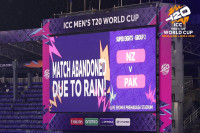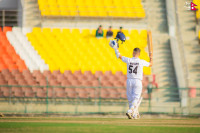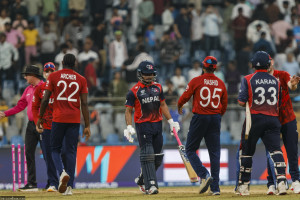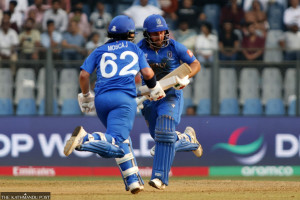Sports
Tennis champions team up to support Nepali athletes in need
The group Athletes for Athletes, the brainchild of Sunira Thapa and Mahika Rana, aims to support underprivileged athletes who have the talent to succeed but lack the resources.
Ellie Davis
While women’s tennis players Sunira Thapa and Mahika Rana were training together to represent Nepal in the South Asian Games in 2023, they talked about their common struggles as athletes in Nepal—a lack of funding, poor facilities, and little recognition of athletics as a legitimate career.
“We used to complain about it a lot,” Rana said, “and we decided we should stop waiting for other people to do something about it.”
The result is the group Athletes for Athletes that the pair recently formed to empower athletes with the resources and support they need to excel in their sport and athletic careers. For years, Nepal’s athletes have struggled to access the resources they need to train while financially supporting themselves.
The government has recently increased investment in youth athletics, but in Thapa and Rana’s eyes, this financial support is not reaching athletes soon enough. Even the most talented tennis players cannot make a living from the sport alone in Nepal, Rana notes.
Tennis tournaments pay roughly Rs80,000 for the winner and Rs40,000 for the runner-up. With only around four tournaments per year, and most athletes not taking home any prize money, these funds aren’t enough to support players’ careers.
Thapa hopes that their group will address the needs of underprivileged athletes in Nepal who have the talent to succeed but lack the resources. They planned to start their work by helping tennis players but eventually expanded to support athletes of all sports.
“We could get where we are today because we have our parents to support us,” Thapa said. “Tennis especially is an expensive sport. There are so many people who have the talent, interest and passion to work for it but don't have the resources.”
Thapa and Rana both got their start in tennis following the footsteps of their parents. Rana picked up a racket at five while watching her dad play, and Thapa was inspired by her mom, who is a national champion in soft tennis.
When Thapa first started training, she looked to Rana as her inspiration in the sport. “I used to watch her [Rana] when I was young, and I wanted to be like her because she was the number one when I had just started,” Thapa said.
Though they often competed against each other, the pair remained close friends off the court.
“Our competition is only inside the court,” Rana said. “Regardless of who loses, we come out of the court as friends.”
For both athletes, representing Nepal in the 2023 Asian Games was the proudest moment of their careers. At fifteen years old, Thapa was the youngest of the 253 Nepali athletes to travel to China for the games, and she is currently training for the 2026 Asian Games.
Meanwhile, Rana no longer competes in tennis, but she wants to encourage young people to take up a sport because of the lifelong lessons athletics has given her.
“Playing tennis helped me so much with my life—when it comes to being punctual, having discipline, or just having respect for one another,” she said.
With their new group, Athletes for Athletes, the pair is planning on raising funds to support underprivileged athletes in Nepal through hosting a watch party of the Wimbledon tournament, tennis’ most important annual sporting event, which is for the first time being broadcast on a Nepali TV channel.
Thapa and Rana also hope to fundraise by organising a ‘tennis summer camp’ for younger players. They plan to use the money they raise for the tennis players outside the Kathmandu Valley, firstly by buying athletic equipment.
Thapa and Rana especially want to support female athletes, noting the added challenges that women face in sports.
“Women in a household, when they want to pick up a sport and turn that into a profession, they have to fight a lot,” Rana said. “You’re not just fighting with your competitors—you’re fighting in your household, you’re fighting for your rights.”
Throughout their careers, during competitions, Thapa and Rana have faced unequal treatment compared to male athletes. The tournament officials have refused to host an equal number of women’s events as men’s events or have assigned the women’s finalists to play on inferior courts.
“I think men are just more glorified,” Thapa said. “Even if the women’s finals are much better, tournaments glorify the men’s finals.”
Thapa and Rana hope that their advocacy will help Nepal evolve to see athletics as a legitimate career path.
“In Nepal, you have to be either a doctor or an engineer,” Rana said. “That is the mindset of the people. They don’t realise being an athlete can be a very rewarding profession as well.”
Athletes from Nepal who have found success at international competitions have done so through personal sacrifice and love for their sport, Rana says. Rana and Thapa hope their group will ensure that athletes do not have to sacrifice quite so much to pursue their dreams.
“Athletes are doing well because they are passionate, not because it pays well,” Rana said. “Everyone knows more support for athletes is much needed.”




 19.71°C Kathmandu
19.71°C Kathmandu















